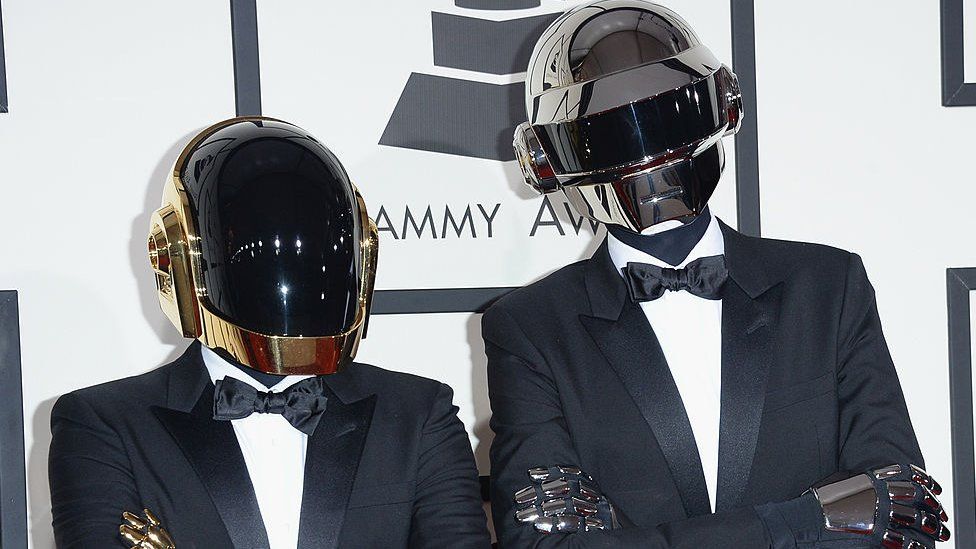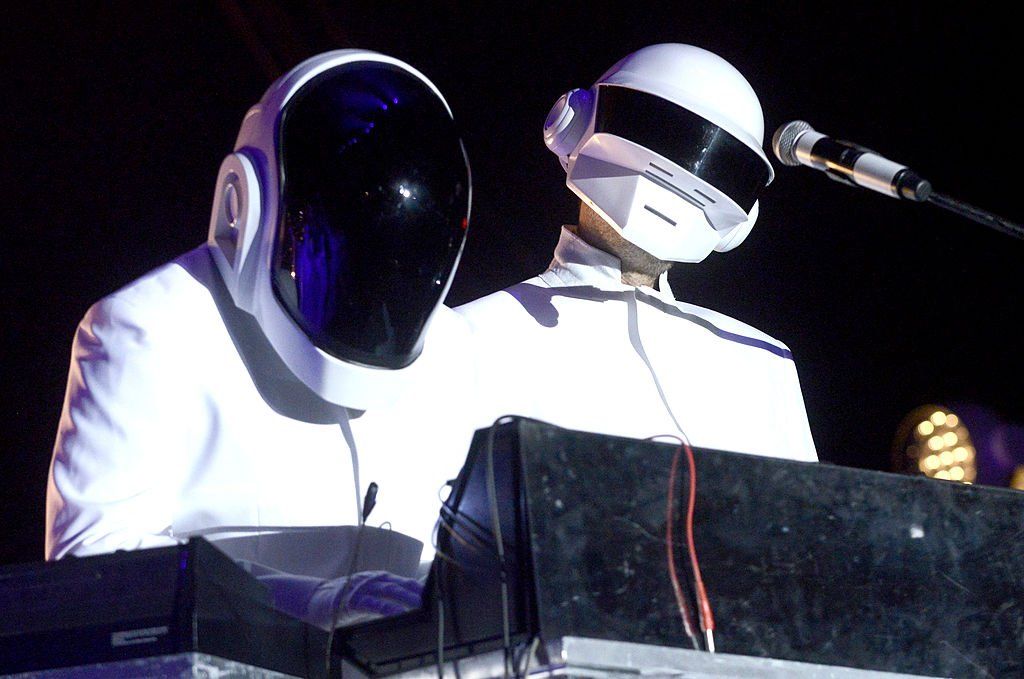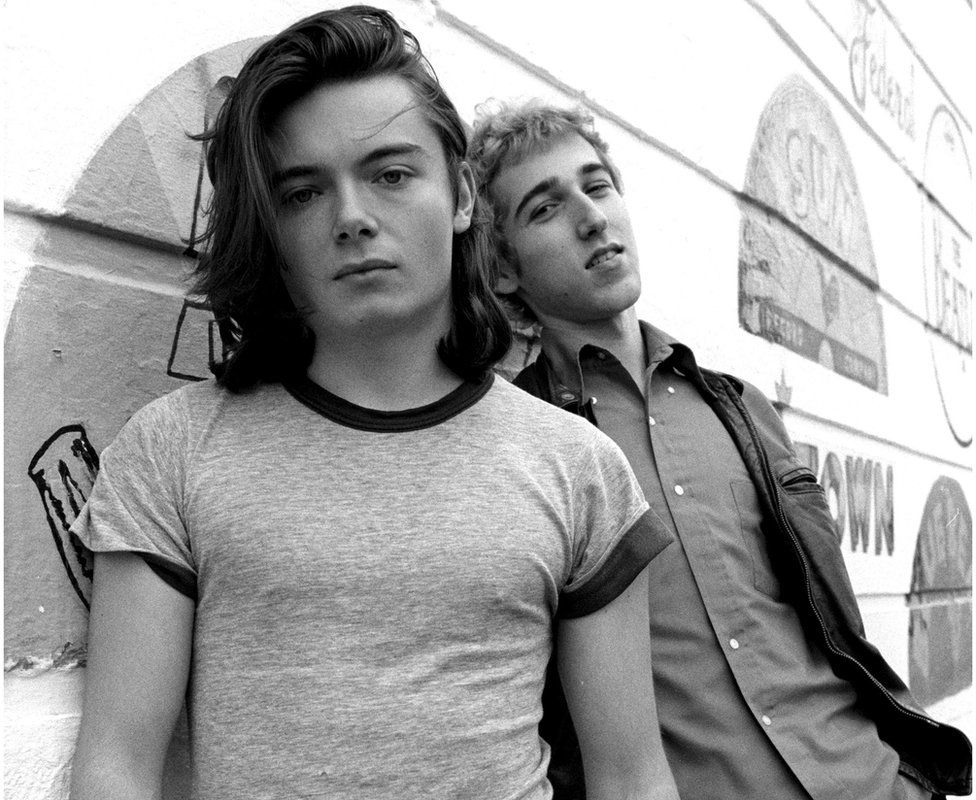Daft Punk announce split after 28 years
 image copyrightGetty Images
image copyrightGetty ImagesDaft Punk, who were responsible for some of the most influential dance tracks of all time, have announced their retirement after nearly 30 years.
The duo broke the news in a typically-enigmatic video, titled Epilogue.
In the clip, musicians Thomas Bangalter and Guy-Manuel de Homem-Christo, dressed in their iconic robot costumes, bid each other farewell in the desert, before one of them self-destructed.
The band's longtime publicist confirmed the split to the BBC.
Formed in Paris in 1993, the group brought the French underground house scene into the charts with hits like One More Time, Da Funk and Around The World.
Their debut album, Homework, is considered a landmark in dance music; while they scored a worldwide hit in 2013 with the retro-disco single Get Lucky, featuring Pharrell Williams and Nile Rodgers.
The song was taken from their most recent record, Random Access Memories, which won the Grammy for album of the year in 2014.
Since then, the band have kept a relatively low profile - although they collaborated with R&B star The Weeknd on two tracks, Starboy and I Feel It Coming, in 2016.
Famously publicity-shy, the musicians were seldom seen in public without their robot headgear, and used processed, computerised vocals on almost all of their biggest hits.
"We're not performers, we're not models - it would not be enjoyable for humanity to see our features," de Homem-Christo once told Rolling Stone magazine, "but the robots are exciting to people."
 image copyrightGetty Images
image copyrightGetty ImagesBangalter and de Homem-Christo met at school in Paris, and began making music together as teenagers alongside Laurent Brancowicz - later of the indie band Phoenix.
Originally called Darlin', the trio released some incredibly basic garage rock songs on a UK compilation album, Shimmies In Super 8, in 1993.
A review in Melody Maker called the music "a daft punky thrash" - indirectly christening the band's second incarnation.
Pretty soon, they had abandoned rock for dance music. A subsequent Darlin' song called Untitled 18 sampled David Bowie's Starman and marked their first experimentation with robotic vocals.
Bidding war
A year later, they passed a cassette of their music to Stuart MacMillan, co-founder of the Scottish techno label Soma, at a rave in Disneyland Paris. On it was the first official Daft Punk song - The New Wave, an uncompromising techno assault on the senses which Soma released in 1994.
But it was Da Funk's infectiously zany mix of G-funk and acid house that really put them on the map.
Originally pressed in a limited run of 2,000 12-inch records, it was virtually ignored until The Chemical Brothers started playing it in their DJ sets. By the end of 1995, it had sold 30,000 copies and as voted song of the year by French club magazine Soda.
A record label bidding war ensued, with the band eventually signing to Virgin Records and releasing Homework - recorded in Bangalter's bedroom - in 1996.
There was something cartoonish about the band's early singles that compensated for the anonymity of the men behind them. It was an idea compounded by Michel Gondry's mesmerising video for Around The World, where every instrument is represented by a groups of dancers (skeletons represent the guitar line, mummies act out the drum pattern and synchronised swimmers are the synths).
It took three years for the band to record a follow-up, during which time Bangalter also scored a UK number one - Music Sounds Better with You - with his side project Stardust.
Discovery, released in 2001, was almost wilfully anti-cool, steeped in references to 70s disco and 80s crooners. At one point it even samples Barry Manilow's Who's Been Sleeping in My Bed.
But the band chopped, spliced, filtered and filleted those sounds to create audacious new songs, with a sense of fun and showmanship that dance music often lacks. If you can listen to the ridiculous guitar arpeggios of Aerodynamic or the party-starting chants of Crescendolls without cracking a smile, they seemed to be saying, maybe it's you who's the robot.
The album's most enduring song, however, is Harder, Better, Faster, Stronger.
Based entirely around Edwin Birdsong's Cola Bottle Baby, a forgotten 70s funk track, it adds a simple vocal line ("Work it harder, make it better / Do it faster, makes us stronger") that is twisted and manipulated in increasingly inventive ways until it's barely recognisable as anything but signal noise.
Kanye West later lifted the track and used it as the basis for his own song, Stronger. Daft Punk were unaware of the sample until they heard it on the radio in Los Angeles.
"The DJ had made an edit of our song at the beginning and then it turned into his song," de Homem-Christo told Billboard in 2007.
"Our song had a good sound, but when he put Kanye's record on, the sound was really fat. It sounds really big. It's not a collaboration in the studio, but the vibe of the music we do separately connected in what he did with the song."
Another four years passed before the release of their third and least essential album, Human After All, after which they wrote the soundtrack to Disney's remake of Tron.
 image copyrightShutterstock
image copyrightShutterstockThey returned to form with 2013's Random Access Memories - a lush, opulent tribute to the music they grew up with, recorded entirely on live instruments, and featuring guest appearances from Chic's Nile Rodgers, Muppets composer Paul Williams and disco innovator Giorgio Moroder, who narrated his own life story over nine minutes of interlocking dance grooves.
The album, which cost more than a million dollars to make, was preceded by the hit single Get Lucky. Speaking to NPR, Bangalter said the song represented the record's theme of connecting the past, present and future of dance music.
"It was somehow maybe a child's dream to possibly one day be able to make music with one of the musicians we really love," he explained.
"So Get Lucky is really about this encounter between Nile [Rodgers] and also Pharrell Williams, [who] we've been friends with and which we've worked with in the past, but about really teaming up and getting outside of our home studio and really reaching out to other musicians and performers and making music and having fun in the studio making music together."
The album brought the duo to a whole new audience, but now it also appears to be a full stop. The end point in their disco odyssey.
The video announcing their split was based on an excerpt from their 2006 film Electroma. As the robot body disintegrated, a caption appeared stating "1993 - 2021". The video closed with an extended excerpt of the song Touch, including the choral refrain: "Hold on. If love is the answer you're home."
The band's publicist Kathryn Frazier offered no explanation for the break-up - but fans flooded social media with tributes.
French media tracking service Visibrain said there were 27 tweets posted every second about the band on Monday afternoon.

Producer Erol Alkan was among them, writing: "Respect to Thomas and Guy-Man. Farewell."
"As a French producer its hard to describe the huge impact Daft Punk had on my life, my music and career," added DJ/producer Habstrakt. "Thank you for forever changing the landscape of music."
"Daft Punk's Discovery album was critical to my development." said Maurice Peebles, editor-in-chief of Complex magazine. "[It] opened up an entire universe i didn't know existed. forever grateful."

Follow us on Facebook, or on Twitter @BBCNewsEnts. If you have a story suggestion email entertainment.news@bbc.co.uk.



No comments